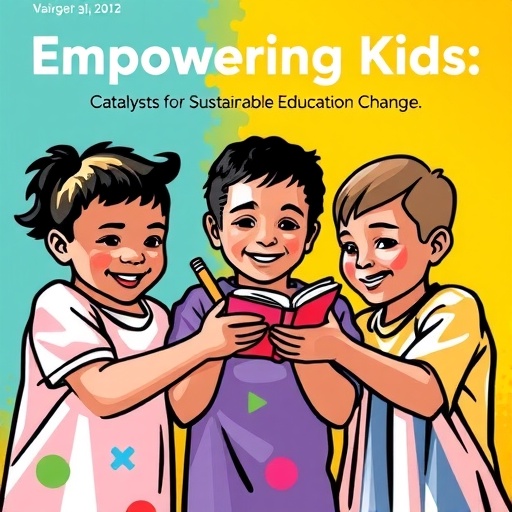In a rapidly changing world where environmental concerns are at the forefront of global discourse, the role of education in fostering sustainable practices cannot be overstated. A groundbreaking study conducted by Šindić, Višnjić-Jevtić, and Lepičnik Vodopivec explores the transformative potential of early childhood education in promoting sustainability. Their research outlines how children, when engaged in educational environments that prioritize sustainability, can become essential agents of change not only within their communities but also on a global scale. Their findings reveal that instilling values of sustainability in young individuals has the power to catalyze a broader cultural shift towards environmentally responsible behaviors.
The core of the research lies in the concept of Education for Sustainable Development (ESD), which is intricately connected to the holistic development of children. The researchers advocate that integrating principles of sustainability into the educational curriculum from a young age equips children with the knowledge and skills necessary to understand complex environmental issues. This understanding promotes critical thinking and encourages children to engage in problem-solving activities, enabling them to address real-world challenges from a young age.
Moreover, the study illustrates the importance of experiential learning in the context of ESD. By participating in hands-on activities, children can directly experience the impact of their actions on the environment. Whether it’s through gardening, recycling projects, or community clean-up initiatives, these practical experiences provide children with invaluable lessons about the interconnectedness of human actions and ecological health. Such hands-on engagement cultivates a sense of responsibility and ownership over their environment, further reinforcing the values of sustainability.
The researchers also emphasize the significance of community involvement in nurturing these young sustainability champions. When educational institutions collaborate with local communities, children gain access to resources and knowledge that extend beyond the classroom. Community-based projects serve as a bridge, linking theoretical concepts with practical applications, thereby enriching the learning experience. This collaboration fosters a sense of belonging and empowers children to take initiative in their communities, reinforcing the idea that their actions can lead to meaningful change.
Furthermore, the study highlights stories of existing programs focused on ESD that have successfully integrated children as active participants in their learning journeys. These programs provide a framework for understanding how education can evolve to better serve the needs of future generations. By examining case studies where children have taken the lead in sustainability initiatives, the research underscores the potential for children to inspire adults and drive community-level change.
One particularly compelling aspect of the research is the role of educators in this process. The findings suggest that teachers play a crucial role in shaping attitudes towards sustainability. Educators who are trained in ESD can deliver content that resonates with children and makes sustainability relatable. These teachers are equipped not only with knowledge but also with pedagogical techniques that foster an environment where inquiry and exploration are encouraged. The study posits that when educators model sustainable behaviors, they can significantly influence their students’ values and habits.
The implications of this research extend beyond the classroom. By empowering children to become advocates for sustainability, there is potential for a generational shift in how society approaches environmental challenges. The study posits that today’s children, equipped with the understanding and skills nurtured through ESD, will influence future policies and practices that prioritize ecological sustainability. This may lead to the development of more sustainable communities, as children bring their insights and ideas into discussions about urban planning, resource management, and public policy.
Additionally, the researchers argue that creating a culture of sustainability within educational institutions is pivotal. This can be achieved by incorporating sustainable practices in school operations, promoting initiatives that reduce waste, conserve energy, and encourage biodiversity. Schools can serve as living laboratories where children observe and participate in sustainable practices, reinforcing their learning and promoting a culture of environmental stewardship.
However, the challenges of implementing such comprehensive changes in education systems are multifaceted. The research acknowledges the need for policy adjustments, curriculum development, and teacher training programs to effectively incorporate ESD into the mainstream educational framework. By advocating for systemic support, the researchers stress the importance of government and educational stakeholders in promoting sustainable education practices, thus creating an environment where children are consistently exposed to sustainability concepts.
As the world grapples with pressing environmental issues ranging from climate change to biodiversity loss, the call for education that prepares children for these challenges becomes more urgent. The study serves as a compelling reminder of the vital role educators, parents, and community members play in guiding the next generation. The urgency of instilling sustainable values in children cannot be understated, as they will be tasked with solving problems that are often too complex for adults.
In conclusion, Šindić, Višnjić-Jevtić, and Lepičnik Vodopivec’s research presents a passionate argument for the transformative power of education in fostering sustainability through early childhood development. By cultivating an environment that prioritizes sustainability and empowers children, society can nurture a generation that values ecological balance and actively seeks innovative solutions to the challenges that lie ahead. The journey towards sustainability begins in the classroom, shaping not just individual lives but entire communities and the planet.
Subject of Research: Education for Sustainable Development in Early Childhood
Article Title: ECEfS from Kindergarten to Community: Children as Agents of Change in Education for Sustainable Development
Article References:
Šindić, A., Višnjić-Jevtić, A. & Lepičnik Vodopivec, J. ECEfS from Kindergarten to Community: Children as Agents of Change in Education for Sustainable Development.
IJEC (2025). https://doi.org/10.1007/s13158-025-00432-6
Image Credits: AI Generated
DOI:
Keywords: Education for Sustainable Development, Early Childhood Education, Children as Agents of Change, Sustainability, Community Engagement, Experiential Learning, Educator Role in Sustainability.




